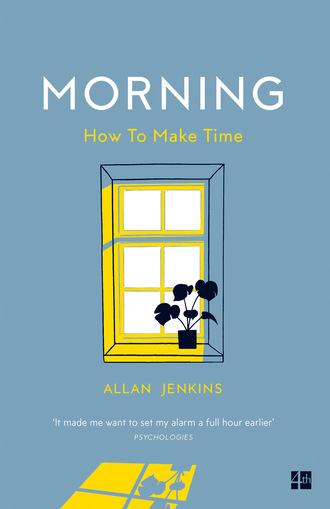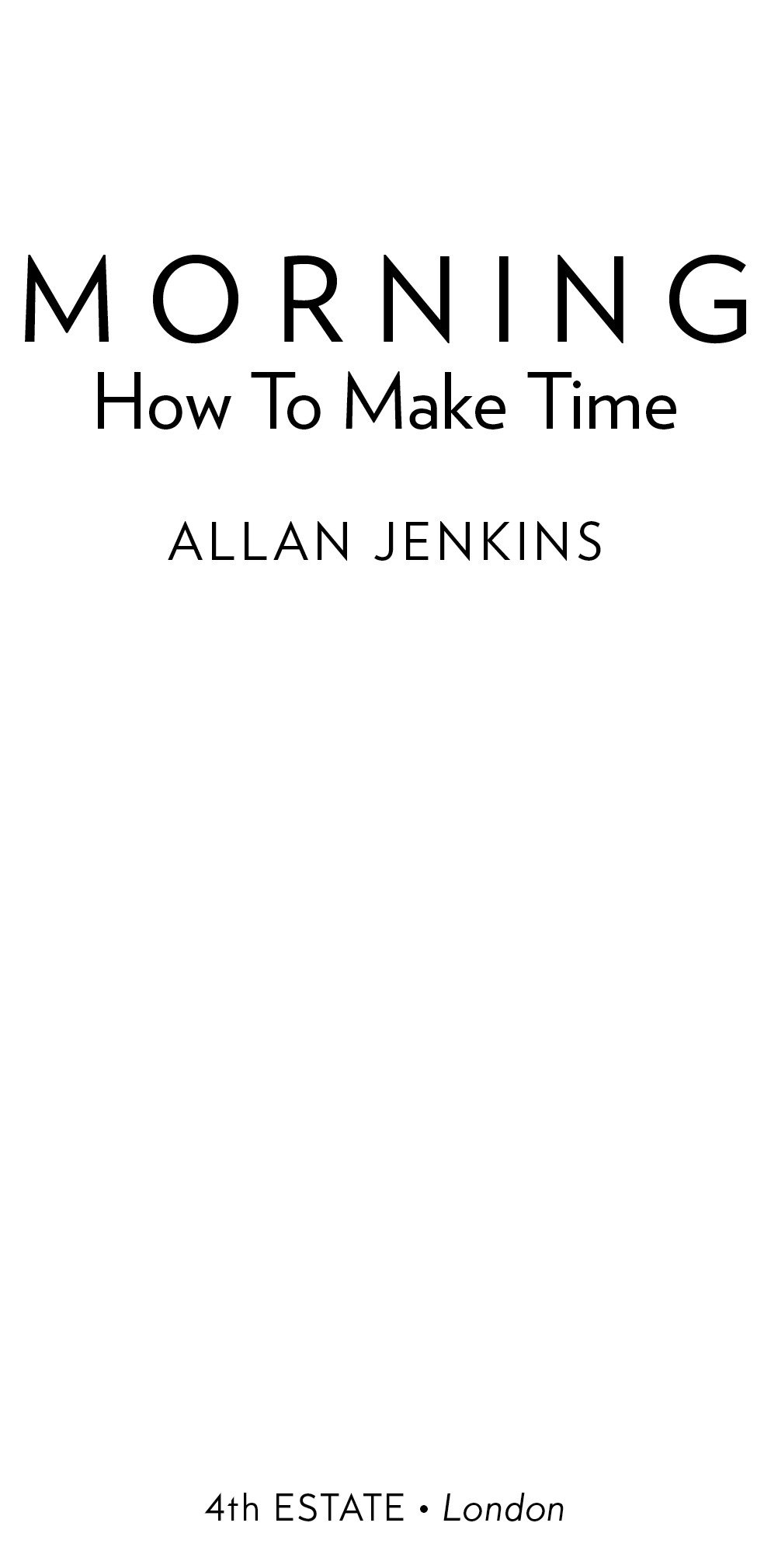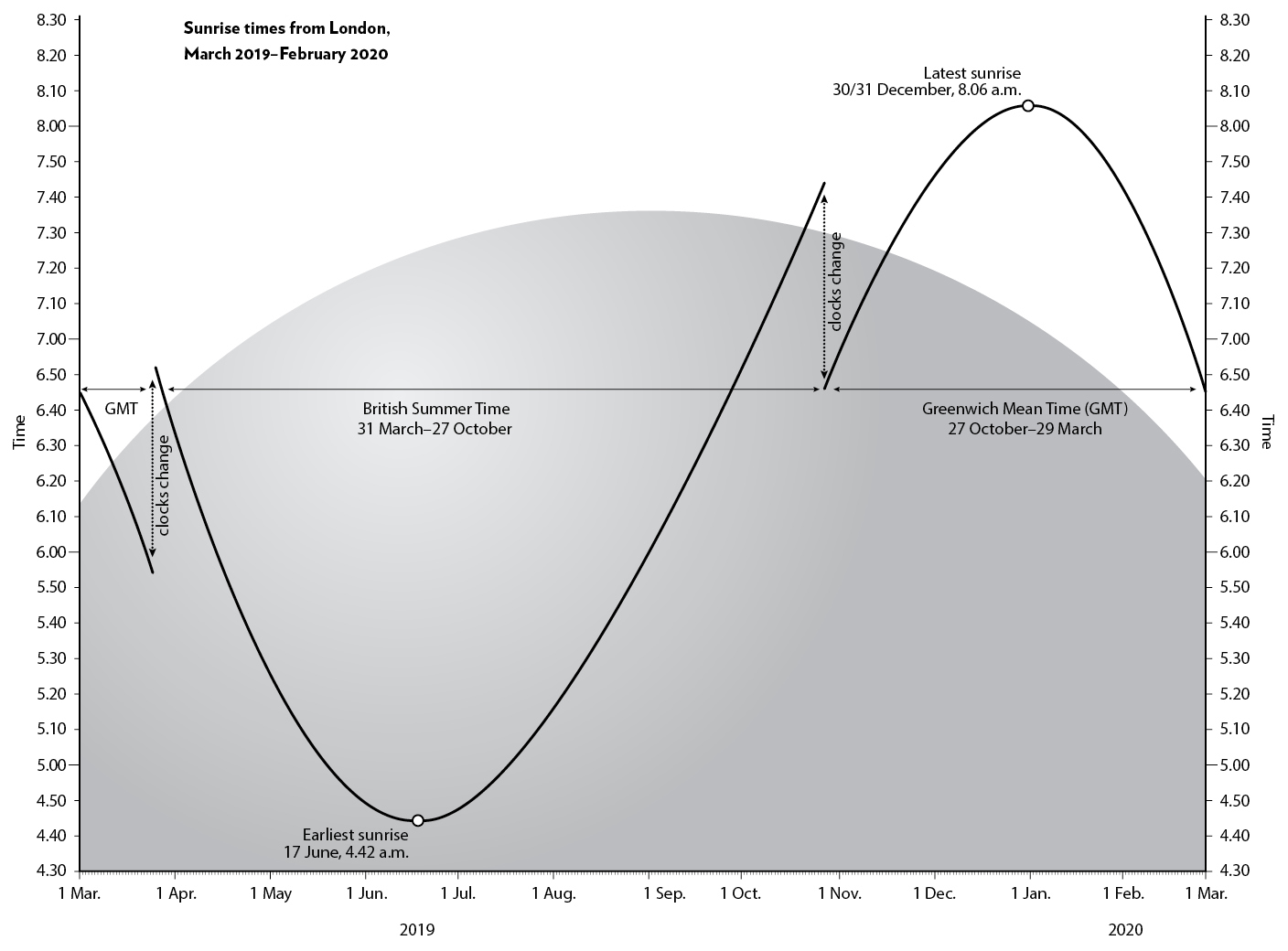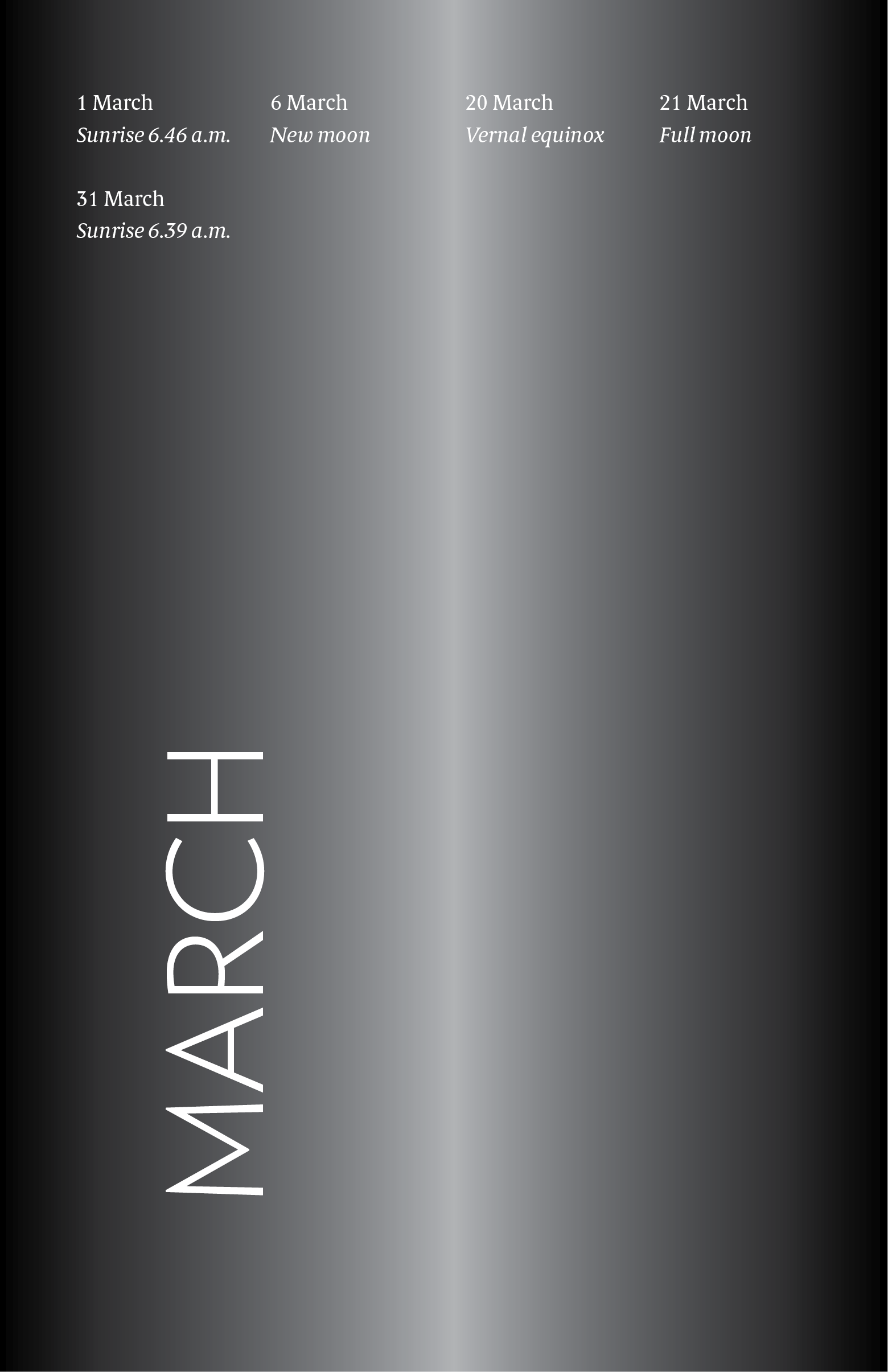
Полная версия
Morning


Copyright
4th Estate
An imprint of HarperCollinsPublishers
1 London Bridge Street
London SE1 9GF
www.4thEstate.co.uk
This eBook first published in Great Britain by 4th Estate in 2018
Copyright © Allan Jenkins 2018
Cover design by Heike Schussler
Allan Jenkins asserts the moral right to be identified as the author of this work
‘Alba’ by Ezra Pound: from Selected Poems by Ezra Pound reproduced with kind permission from Faber and Faber Ltd. and from Personae, copyright © 1926 by Ezra Pound, reprinted by permission of New Directions Publishing Corp.
A catalogue record for this book is available from the British Library
All rights reserved under International and Pan-American Copyright Conventions. By payment of the required fees, you have been granted the non-exclusive, non-transferable right to access and read the text of this e-book on screen. No part of this text may be reproduced, transmitted, down-loaded, decompiled, reverse engineered, or stored in or introduced into any information storage and retrieval system, in any form or by any means, whether electronic or mechanical, now known or hereinafter invented, without the express written permission of HarperCollins.
Source ISBN: 9780008264376
Ebook Edition © March 2018 ISBN: 9780008264352
Version: 2019-01-22
Dedication
For Henriette
For everything
Contents
Cover
Title page
Copyright
Dedication
Foreword
How to make time
A lexicon of dawn
Other usage
A manifesto
Sunrise graph
My morning: Allan Jenkins
My morning: Jamie Oliver
Dawn diary
Dawn diary: March
My morning: Jane Domingos
Dawn diary: April
My morning: Guy Grieve
Dawn diary: May
My morning: Benjamin Raynard
Dawn diary: June
My morning: Philip Hoare
Dawn diary: July
My morning: Anna Koska
Dawn diary: August
My morning: Ian McMillan
Dawn diary: September
My morning: Marlena Spieler
Dawn diary: October
My morning: Lemn Sissay
Dawn diary: November
My morning: Liza Adamczewski
Dawn diary: December
My morning: Samuel West
Dawn diary: January
My morning: Linda Grant
Dawn diary: February
The neuroscience of sleep and light
The philosophy of daybreak
Ornithology and the dawn chorus
Divine Dawn
Conclusion
Early rising: The 20 rules
Acknowledgements
Illustration credits
By the same author
About the publisher
Foreword
As cool as the pale wet leaves
of lily-of-the-valley
She lay beside me in the dawn
Ezra Pound, ‘Alba’
For years now I have been getting up around 5 a.m. in winter (often earlier in summer). It suits me. I like the energy, the awareness before the day wakes. The quiet before dawn in winter, the shift from night to day in summer. I get things done. I write. I read. I think. I garden in soft light. It is my best time of day.
This short book will explore why.
I will make the case for being alert at first light. To wake in the quiet moments when the day inhales and the night fails. Just you and the stuff that surrounds you. To be extra alive in a way that near silence allows, sensitive to minute moments of change. To be able to gather yourself, your thoughts and feelings, whether it is to sit, to write, to walk, to read, to be inside or outside, to be sowing seed, to garden, to be saturated in experience. The gift of more time in the morning, so easily given and so easily missed. The simple opportunity to start the working day refreshed, renewed. To be whole in a way that near silence gives, to be one with the wild. To be natural in nature. To nurture yourself. The chance to be alive to your breath and distant from distraction. The space to be (by) yourself, before others wake.
It’s easy, take it, half an hour, an hour, maybe more when you want. To be comfortable with yourself in a way that being alone allows no matter how many people you share your life with. The opportunity is there every day. Just you and the morning light, like flower or fauna. To learn to allow yourself to build in awareness, even if it’s just of birdsong. To be awake in a moving meditation. Try it some time, take small steps, the morning world is waiting. You and the sky or a computer screen, the page of an unread book, the taste of tea. Bring the outside inside. The day can start when you want, uncoupled from demands and distraction. And if this doesn’t work for you alone maybe find someone who wants to share the silence.
I will talk to a neuroscientist, a fisherman, a philosopher, painters and poets. I will interview other early morning people. I will examine how changes in light throughout the day, through the year, affect different people, plants. I will report on how time influences behaviour. I will take the first bus. I will report from different latitudes, including the Arctic Circle in summer (from barely three hours of daylight to twenty-four hours of sun) and the effects it has on inhabitants and me.
I will investigate the language of light and morning, the many words from different cultures for dawn and first light and what they mean and how they change.
I will keep an early morning diary from my window. I will describe how the light lifts, the sun rises, the birds sing or not throughout the year. I will observe and report. I will listen and feel.
I will tell the morning’s story.
How to make time
Seize the day. Your morning doesn’t have to be decided by what time you leave the house. The constant conventional rush: for breakfast, a bath or shower, in time for the bus or Tube or drive or walk to work, to get the kids to school. You can free the day, start in a different way, remove the race.
Build up to dawn, wake a little earlier, try half an hour. Skip Newsnight or Netflix, the phone the night before, or whatever it is you watch. They will still be there. Savour the time. Avoid doing the same you always do or the day will fill like an incoming tide. What is it you wanted to do but told yourself you don’t have the time? Paint, possibly? Draw? Read more books? Bake bread? Do a little now. It’s a start. Take baby steps.
Build on it, slowly if you need. Make it an hour earlier, build up to two, it’s honestly even better, open space enough to think and feel. Don’t rush it, take your time, you have enough.
Perhaps try to skip social or other media before you sleep and once you wake. Make your early day a holiday. It is easy, honestly.
If winter is too dark and daunting (though I think it is my favourite season), start in the spring, when the light will be there waiting, as will writing, reading, yoga, walking, sitting. Whatever it is you want.
Try having a window open, your eyes and ears, too. If it is dark use only low light. Sit near the window, let the outside in.
Free your morning and mind, later skip the electric light. You will know where you are, where to walk, what to do. You will have mapped out the space you are in. It’s simple neuroscience.
Dark to light, an eternal transition, be alive to it sometime, aware, awake.
Don’t beat yourself up if you skip it or feel the need to go back to bed. Build it in sometime. There is no right or wrong, only more opportunity. It is magical the morning. A forgiving friend. Yours, too, if you want.
A lexicon of dawn
Afrikaans: aanbreek
Azerbaijani: sübh
Basque: egunsentian
Bosnian: zora
Bulgarian: разсъмване
Catalan: alba
Corsican: alba
Croatian: zora
Czech: úsvit
Danish: daggry
Estonian: koit
French: aube
German: Morgendämmerung
Hawaiian: ao
Hungarian: hajnal
Icelandic: dögun
Irish: breacadh an lae
Italian: alba
Japanese: Yoake
Kurdish: bandev
Latvian: ausma
Lithuanian: aušra
Luxembourgish: Sonnenopgang
Malay: subuh
Maltese: bidunett
Maori: ata
Polish: świt
Portuguese: amanhecer
Romanian: zori
Russian: рассвет
Samoan: vaveao
Serbian: зора
Spanish: alba
Swahili: alfajiri
Swedish: gryning
Turkish: şafak
Urdu: Sahar
Welsh: wawr
Other usage
Old English
uhta
‘the last part of the night, the time just before daybreak’. Also dagian
verb, meaning ‘to become day’ (root of ‘dawn’, the time that marks the beginning of twilight before sunrise)
Middle English, also Scots Gaelic
greking
‘In the grekynge of the day, sir Gawayne hente his hors wondyrs for to seke’ (Malory, Morte D’Arthur)
Irish
le fáinne geal an lae
‘the bright ring of the day’
French
l’heure bleue
Spanish
madrugar
verb, meaning, ‘to get up early’
proverb, Al que madruga, Dios le ayuda, ‘God helps those who rise early’
US Pennsylvania Dutch
the blush
A manifesto
Early morning gives me time, hope, space. At a moment when they are all at a premium. The city (largely) sleeps. Interference is low, distractions minimal. My day opens up. Stretches languidly. My mind is clearer. My thoughts easier to read. Anxious urgency is removed. The light is almost elusive. I feel my way around, the room, my home. I become like a cat with whiskers. I pour tea. I fill the pot by sound not sight, a reassuring glug. It is curiously comforting to decouple from incessant electric light. I am aware of the air around me. I have hours on my own, free to follow my feelings. I am liberated from the day’s demands. More at one, if you will, with the more natural world. Perhaps just sitting, watching my thoughts scroll by. I can write, walk, gaze out of the window, soak it in, enjoy it, luxuriate. There is time to wonder what I want to say. Time to drink good tea while people around me sleep. Time to hear the blackbird signal dawn (midsummer sunrise 4.42 a.m., London, and gone 8 a.m. by midwinter).
Early morning connects me, moves me, makes me more awake. I listen to more isolated sound while the day and light lift. My room more slowly makes its presence felt. My day, my world, knock politely. There is time to wait, rising sun on my face as I write. Cool light as I walk or garden, free from chatter, except my own, perhaps today a loop over Hampstead Heath, just me and the bumblebees, another early walker in the distance. I’ll nod, quietly say hello if we pass, a brotherly sisterhood of sharing with other early morning appreciators. An hour’s open-hearted meditation on morning, light and life. Stopping to admire the fading greening, perhaps catch sight of a solo heron. I am back before breakfast, in time to wake others up. Time to read, say, Ted Hughes’s ‘The Hawk in the Rain’, to catch undone things from days before. Time to build in new memories, sow new seed.
From night to day, dark to dawn, winter to spring, there is enchantment for me in transition. This is when the owl flies, the curlew calls, the earth inhales or exhales. Flux, a natural thing. From boy to man, child to adult, it is in the letting go, watching, observing, not trying to control the change, where enchantment, even the miraculous, happens. Before breakfast was when I roamed by the river, ambled through fields and woods as a child, in search of young mushrooms and magic. Seeing the dog fox returning to his den, hearing the call of the wild, I knew anything, everything, was possible; reality’s grip lessened for a moment and therein lay the charm. No longer defined by home or who my parents were, there were other possibilities on offer. Whatever I wanted. My imagination soared with the shift in light.
Decades later it still holds true. You can do near anything you want to, be almost anybody you want, the rest of the world is asleep. Loosen your shackles. For an hour or two feel free. There is nothing holding you back. Dawn is an enchanted world behind a hidden door, there if you want it, fine if you don’t. ‘Morning is when I am awake and there is a dawn in me,’ says Thoreau. He’s right.
Sunrise graph

My morning: Allan Jenkins
First, could you tell me a little about yourself?
I am a writer, an editor, a gardener. At twenty, as a single parent, I could sometimes skip sleep completely if, say, my young daughters were unwell. Now I need maybe seven hours, perhaps a nap at the weekend.
What time do you wake up (and why)?
Some time before 5 a.m. in summer, a little later in winter. I sleep with sliding doors open, no curtains. It is usually the birds that wake me, even gulls a joyful thing. It is the time I write or summer-garden, though I sometimes get caught up in social media, before my wife gets up.
Do you have a morning ritual?
I like to make tea in the dark. I think my senses may be heightened. Earl Grey in a pot, no milk.
How does being awake early affect your life?
It gives me time to be me, before the day begins.
What time do you sleep?
Mostly around ten-ish, give or take.
Does your sleep vary through the year?
I am up earlier in summer, more energetic, more excitable and so are the birds. I don’t know that I get more done.
Has your sleep pattern changed?
Maybe less sleep with age, though it is more likely I have carved out time to write and/or garden that I don’t have in the evening when I need to cook and digest the day.
Is the light important?
It is everything. I think I am addicted. The shift from night, the sometimes timid start of day. My world wakes. Particularly if there is sun, of course. I write by an open window facing south-east; the light draws me outside, catches the vase of flowers beside me (there are always flowers). Most mornings I take a photo, same photo, same view, of the sunrise. I tell myself it is like Monet’s water lilies or haystacks but I think I am mapping my life in mornings.
What do you like least about being awake early?
I can lose an hour reading useless links to politics or old YouTube, purely because I can.
What do you like best about being awake early?
The energy, the time it gives; it feels like a gift (apologies for romance but it is true). Sometimes it allows me to escape to the allotment, feed it, water it, sow seeds, connect with land and wild.
How would you sum up your thoughts on your mornings in 100 words or less?
Sometimes I feel it is my secret, like Narnia, outside time or at least the rest of the day. I cannot believe everyone doesn’t know about it and take an occasional step through the wardrobe.
My morning: Jamie Oliver
First, could you tell me a little about yourself?
My name is Jamie Oliver, I’m a chef, writer and child health campaigner. I was born in 1975 in Southend, Essex. I have five fantastic kids and live mainly in north London.
What time do you wake up (and why)?
Work days I tend to wake up at 4.45 a.m. by my phone and the gentle music of a band called Aqualung. Saying that, I’ve normally switched it off within three seconds. I get up that early because I start official work at 7.30 a.m., where time is planned within an inch of its life, so if I want to go to the gym or squeeze a meeting in that can’t wait I use early mornings as my trump card to do what I want. I find it really useful. If I was off work and didn’t have kids jumping on me I probably could easily lie in. I don’t remember when that last happened.
Do you have a morning ritual?
I tiptoe to my bathroom where I fill a big bath with hot water full to the brim with a squeeze of Johnson’s purple baby bubble bath which I’ve taken a shine to. I have a thing about the ritual of the bath. I found my dream tub in a scrapyard eighteen years ago: a lucky find, Clarice Cliff made it, solid porcelain. The bath is my only quiet time, true relaxation, to relieve my aching muscles. I take thirty minutes to try to think and visualise my day ahead. I then pack my clothes, get in my gym gear and run, cycle or scooter to the gym.
How does being awake early affect your life?
I think it arms me to be more productive, more creative, gives me a head start that I feel I need as many people look to me for answers and clarity from 7.30 a.m. onwards so I need to start before others tend to. The effect is, I think, you have a different rhythm, maybe it feels like a cheat. I crave early morning peace and quiet and space for thought and to appreciate nature, particularly birds singing. Dad used to wake me up early as a kid, he said people died in bed – so I guess it’s stuck.
What time do you sleep?
I go to bed about 10 p.m. if I can and I sleep very well, but actually physically going to bed is one of my hardest challenges in the day. I think there’s always so many reasons not to just go to bed, so like a baby I set my watch to remind me to get in bed. Pathetic, but it works really well.
Does your sleep vary through the year?
No, it’s always the same unless I’m on holiday when I tend to chill out more and have a lie in.
Has your sleep pattern changed?
Yes. I used to get sleep very wrong. I didn’t understand it or respect it, I took it for granted like a luxury not a necessity. I only used to get three or so hours’ sleep for about six years, which got me in the end. For the first time I felt really sad, which has never been my default as I’m a very positive person most of the time so I had to change my thinking and doing this has changed my life. Sleep is as important as nutrition.
Is the light important?
Oh yeah, I crave a little kiss of sun, it feels like a charge, comfort, joy. I’ll follow light like I follow the smell of good food, never direct light unless it’s sunrise or sunset. To have a power nap facing autumn orange light on your face is true luxury joy.
What do you like least about being awake early?
The fear of waking up the kids and especially the baby.
What do you like best about being awake early?
The chance to be one step ahead of most.
How would you sum up your thoughts on your mornings in 100 words or less?
My early mornings are a lonely, self-indulgent, special space that I choose to create for myself because we can. Where time goes at normal speed instead of fast forward.
Dawn diary
The little violets’ heads bowed on their stems,
The pre-dawn gossamers, all dew and scrim
And star-lace
Seamus Heaney, Mycenae Lookout, ‘His Dawn Vision’

March
March 1
4.05 a.m., London
First day of meteorological spring. Sunrise calculated: 6.45 a.m. I read, I write, I make tea. By 5 a.m. the back-garden blackbird’s song is less shouty, more melodious. There are runs, there is sweetness. It feels tender, personal. I wonder if he can see me from my open window, face picked out in the screen light. It’s still too dark to see him. Maybe there is an appreciative female, maybe as yet there is only me. It is quiet, just my fingers quietly rat-tatting on the computer keyboard, him and his sweet song.
March 6
5 a.m.
Is it the streetlight out the front that makes the church bird sing? I lie in bed listening through the open doors but Henri’s sleeping breath is anxious. I cuddle her until it calms. My dawn writing feels like a series. The fascination of recording almost invisible change. Here I sit at my window. Noting the subtle shift.
I miss an early bus to the plot, watch it pass as I am putting on my boots. I am still on site before seven. Here to sow the first root crops of spring. One row each of red beetroot and Chioggia, marked by blue string. The rain starts as I am sowing. I love its gentle touch. The ponds are alive with bulbous spawn.
It’s a double bakery shop today. First, the French for pastry, another for cinnamon buns. I am home and armed with breads and papers before my daughter Kala, who lives close by, comes around for breakfast.
March 7
5.20 a.m.
Cooler at the window, as I write. Daybreak gathering, mauve clouds to the south, steel sky north-east, watercolour streaks at twelve o’clock. Crows are adding bass notes to the small-bird choir. It is almost light at 6.10 a.m., skies a dirty denim. Is it mad to say I miss the dark in the mornings? I sowed five rows of spring seed on Sunday, so they need light and warmth, and me too, but now winter is weaker I feel some slight regret. It might be a cocoon thing, anyway it will soon pass. The anemones by the screen no longer need monitor light, their chiffon petals picked out in subdued daylight.
March 8
3.28 a.m.
So now I know when the church blackbird first calls. Incessant rain had woken me, then the chorus began. There is a joy there, in rain and song that breaks through any mood. No neighbouring house lights anywhere. People asleep as far as I can see. Just me and my tuneful feathered friends. I love being wrapped in this quarter-light. There is comfort to be found in doing nothing much, breathing, aware of the early day, the almost silence in a city.
March 10
2.28 a.m.
Back home after being trapped on a broken train, a three-hour journey taking ten. Stepping out of the cab, ready for bed, to be greeted by the blackbird singing as though only for me. The mystery of the song and when it starts. I pause for a minute, soak it in, stand under its shower, and then haul myself up the stairs.

